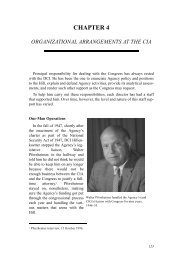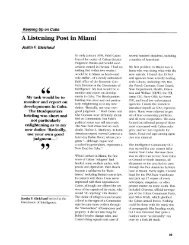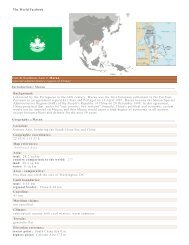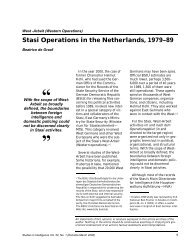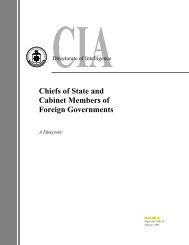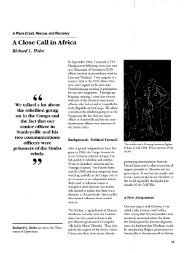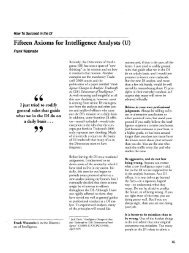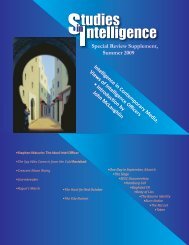Analytic Culture in the U.S. Intelligence Community (PDF) - CIA
Analytic Culture in the U.S. Intelligence Community (PDF) - CIA
Analytic Culture in the U.S. Intelligence Community (PDF) - CIA
Create successful ePaper yourself
Turn your PDF publications into a flip-book with our unique Google optimized e-Paper software.
FINDINGS<br />
selves, but <strong>in</strong> articulat<strong>in</strong>g those methods for <strong>the</strong> purpose of test<strong>in</strong>g and validat<strong>in</strong>g<br />
<strong>the</strong>m and <strong>the</strong>n test<strong>in</strong>g <strong>the</strong>ir effectiveness throughout <strong>the</strong> community. In <strong>the</strong><br />
long view, develop<strong>in</strong>g <strong>the</strong> science of <strong>in</strong>telligence analysis is easy; what is difficult<br />
is chang<strong>in</strong>g <strong>the</strong> perception of <strong>the</strong> analytic practitioners and managers<br />
and, <strong>in</strong> turn, modify<strong>in</strong>g <strong>the</strong> culture of tradecraft.<br />
F<strong>in</strong>d<strong>in</strong>g: Confirmation Bias, Norms, and Taboos<br />
Organization is key, because it sets up relationships among people<br />
through allocation and control of resources and rewards. It draws<br />
on tactical power to monopolize or parcel out liens and claims, to<br />
channel action <strong>in</strong>to certa<strong>in</strong> pathways while <strong>in</strong>terdict<strong>in</strong>g <strong>the</strong> flow of<br />
action <strong>in</strong>to o<strong>the</strong>rs. Some th<strong>in</strong>gs become possible and likely; o<strong>the</strong>rs<br />
are rendered unlikely.<br />
Eric Wolf 13<br />
Time constra<strong>in</strong>ts affect both <strong>the</strong> general analytic production cycle and analytic<br />
methodology by contribut<strong>in</strong>g to and exacerbat<strong>in</strong>g cognitive biases.<br />
Although <strong>the</strong>re are any number of cognitive biases to which <strong>the</strong> human m<strong>in</strong>d<br />
is susceptible, one <strong>in</strong> particular became evident dur<strong>in</strong>g <strong>the</strong> triangulation phase<br />
and <strong>in</strong>terpretive analysis of <strong>the</strong> <strong>in</strong>terview and observation data of this study.<br />
The cognitive bias identified most often was confirmation bias, which is <strong>the</strong><br />
tendency of <strong>in</strong>dividuals to select evidence that supports ra<strong>the</strong>r than refutes a<br />
given hypo<strong>the</strong>sis. 14<br />
Although <strong>the</strong> psychological mechanism by which confirmation bias occurs<br />
is <strong>in</strong> debate, confirmatory behavior is a consistent f<strong>in</strong>d<strong>in</strong>g throughout <strong>the</strong><br />
experimental psychology and cognitive science literature. Ra<strong>the</strong>r than focus<br />
on <strong>the</strong> mechanism and nomenclature, <strong>the</strong> term “confirmation bias” is used <strong>in</strong><br />
this work as a description of confirmatory behavior. This behavior was<br />
13<br />
Eric Wolf was an anthropologist who focused on power, social structures, and <strong>the</strong> third world.<br />
His work on power and <strong>the</strong> lives of peasants is considered a modern anthropological classic. Eric<br />
Wolf, Pathways of Power.<br />
14<br />
There is a fair amount of disagreement <strong>in</strong> <strong>the</strong> psychological literature regard<strong>in</strong>g <strong>the</strong> mechanism<br />
by which an <strong>in</strong>dividual displays confirmatory behavior. Some researchers attribute it to motivational<br />
factors, for example, a desire to ma<strong>in</strong>ta<strong>in</strong> respect with<strong>in</strong> a group. O<strong>the</strong>r researchers attribute<br />
it to selectivity factors, an unconscious cognitive selection of data that confirms <strong>the</strong> current status<br />
quo. Some researchers attribute it to social factors, a subspecies of groupth<strong>in</strong>k (see Irv<strong>in</strong>g Janis,<br />
Groupth<strong>in</strong>k). Still o<strong>the</strong>rs ascribe it to a misapplication of heuristics, whereby an <strong>in</strong>dividual learns<br />
a set of rules that solves one problem and <strong>the</strong>n beg<strong>in</strong>s us<strong>in</strong>g that same set of rules to try to solve<br />
o<strong>the</strong>r types of problems. Although <strong>the</strong> literature is extensive, Karl Popper’s The Logic of Scientific<br />
Discovery provides a foundation for understand<strong>in</strong>g <strong>the</strong> issue. Jonathan Evans’ Bias <strong>in</strong> Human<br />
Reason<strong>in</strong>g: Causes and Consequences is still a useful and concise summary of <strong>the</strong> research<br />
related to confirmation bias.<br />
21






